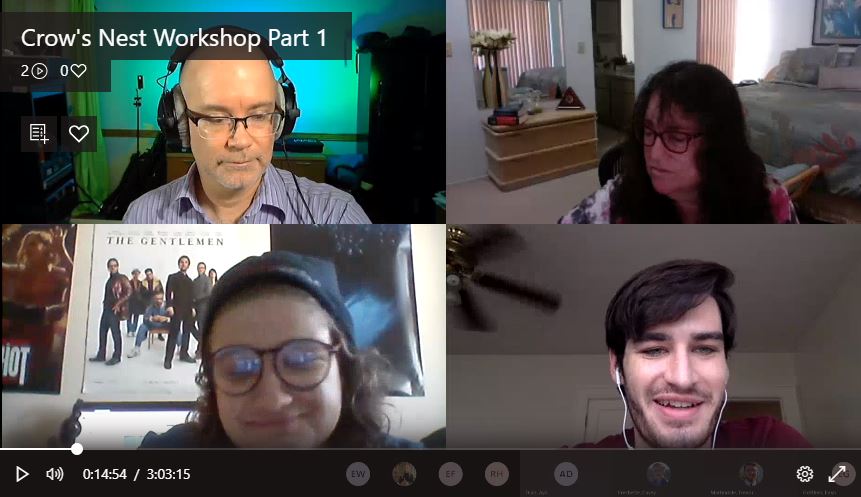Pictured Above: The Crow’s Nest staff members Sophie Ojdanic (bottom left), Nancy McCann (top right) and Patrick Tobin met via Microsoft Teams with professor Chris Campbell for a workshop on Aug. 15.
Sophie Ojdanic | The Crow’s Nest
By Trevor Martindale
As USF St. Petersburg begins the fall semester in a modified second phase of its COVID-19 Returning to Campus plan, student organizations are attempting to overcome unprecedented obstacles.
In-person events and meetings are prohibited, with the exception of those approved by the USF COVID-19 task force.
Many clubs and organizations have opted to hold meetings and events on platforms such as Zoom and Microsoft Teams.
“For meetings this fall, we are continuing to utilize the meeting function of Microsoft Teams,” said Tijen Jones, president of the Ethics and Debate Club. “While this does come with complications in a club that prides itself on a large and open discussion, (we) are putting together a set of rules to keep online meetings running smoothly as we prepare for a larger group in the fall.”
Although meetings and events are salvageable, many pre-planned events had to be canceled or dramatically altered.
“We usually do a fundraiser to help other communities,” said Chelsi Chavez, communications director for the Spanish Club. “But we won’t be able to do that this semester.”
Planned Parenthood Action also canceled events, according to club president Rebecca Nero.
“We had many plans scrapped, we were supposed to have a big women’s conference,” Nero said in an email to The Crow’s Nest.“We reserved a ballroom and everything, looks like we won’t be able to do that for a while.”
Some students highlighted the potential for virtual meetings, citing the benefits of online communication.
The Pre-Med Club aims to prepare students for medical school by inviting doctors and medical school admissions officers as guest speakers.
“If anything, I think our meetings will be more substantive than before,” said Caitlyn Roland, president of the Pre-Med Club. “Now representatives from out-of-state schools are more accessible.”
The Spanish Club has fundamentally changed its approach to the semester, now focusing on collaborations with Spanish professors and language development.
“All of our (previous) ideas for events got canned,” Chavez said. “But we are excited about the opportunity to change our approach.”
Though most student leaders have found positive aspects of online engagement, many share concerns regarding outreach and member retention.
Nero believes newer clubs will struggle to grow.
“The major concern I have is participation; we already struggled with it prior to (COVID-19) as a newer student org,” Nero said.
Roland shared this sentiment.
“It was hard enough as is to build membership in person,” Roland said. “Now we have to worry about getting people to read our emails and follow our social media outlets.”
Student clubs and organizations will undoubtedly be forced to make adjustments and adapt to the fall guidelines as they change.
To connect with different clubs or organizations, visit usfsp.campuslabs.com/engage.



